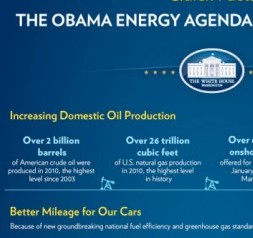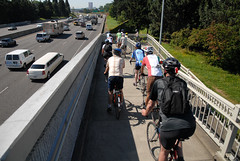
An economy putting the pinch on pocketbooks, rising gas prices, foreign oil imported from terrorist havens, a bankrupt federal infrastructure budget — all of these factors (and others) are creating a perfect political storm that could lead to a significant change in U.S. energy policy.
With about 2/3 of our country’s oil consumption used for transportation, the energy policy proposals coming out of Washington D.C. correctly focus on how we power our vehicles. Unfortunately, they completely ignore the ability of the American people to power themselves.
There’s a huge disconnect in the White House and on Capitol Hill on this issue.
The bottom line is this: By various estimates, about 40% of trips made in our cities are two miles or less and right now almost all of those trips are made by car.
Switch a good percentage of those short trips to bicycling and we’d use a lot less oil and have a more stable economy (more money in our pockets) and a more resilient energy outlook.
Sounds simple, but because bicycling lacks real political respect and is still seen as an “enhancement” by many, it is left out of major policy proposals. Here are two such proposals I’ve seen recently. The first is from President Obama (as shared on May 6th):

Obama’s plan is to find more oil here in the states to use in cars, improve gas mileage in cars, invest in electric cars, invest in biofuels research for cars, and so on. No mention of investments or initiatives that might increase the use of the most energy-efficient, lowest-cost form of transportation ever invented (bicycles). That’s disappointing because we all know President Obama is keenly aware of bicycling.
And today I read Oregon Senator Ron Wyden’s approach to the problem. Wyden says he’ll, “increase energy security and reduce dependence on foreign oil by integrating many types of cutting edge alternative fuel sources into our transportation infrastructure.”
And by “cutting edge alternative fuel sources” he doesn’t mean muscle power.
I played a game while reading Wyden’s quotes in his press release. I imagined he was pushing for new bike policies..
“The price of oil wouldn’t matter as much if Americans had more ways to get from point A to point B without oil…
“The technology exists [bicycles]. There are already ways to use
electricity and other clean fuels to power cars, trucks, buses, and off-road vehicles[bicycles]. This bill makes thesetechnologies[bicycles] more accessible, giving Americans alternatives to energy while letting the market decide which of these new fuels will work best for different types of vehicles and for different parts of the country.”
So, while electric cars and better gas mileage get the spotlight in the form of major policy proposals, all bicycling gets is a bit of cheerleading in a measly blog post.
Bicycling as a political issue is funny that way. When it comes to green-leaning speeches and photo-ops, bicycling is welcome to the table with the adults; but when it’s time to get serious, bicycling is sent out of the room and made to eat at the kids’ table.
Perhaps all of us advocates and concerned citizens should adopt an energy policy of our own — like how to spend more of it figuring out how to be taken seriously.


